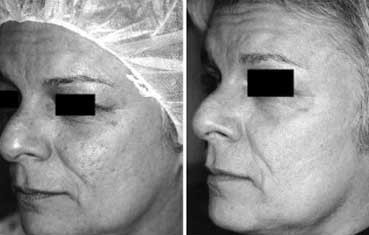Acne Scars
80 to 90 % of individuals that have acne scars usually show scars that are related to a loss of collagen (these are known as atrophic scars), while a smaller percentage of individuals show hypertrophic scars.
Acne Scar Treatments There are quite a few highly aggressive surgical treatment options available which are able to show improvement in acne scars. Some treatment options are able to resolve the scarred skin surface and expose the unblemished layers of the skin. These treatment options include the following:
- Dermabrasion
- Lasers treatments
- Injections given beneath the skin, known as “fillers”
- Chemical peeling using different peeling agents


Topical Acne Scar Treatments
According to the American Academy of Dermatology (AAD), topical treatment options for acne scars are useful in diminishing the appearance of acne scars but do not help in removing them. A number of over-the-counter nonprescription as well as prescription medications are available and they assist in flattening raised scars and also in reducing the degree of skin discoloration.
Consultation with a qualified dermatologist is recommended in selecting the best treatment suited for a particular person’s condition. If the acne scars are very severe and raised, it would become essential to use a prescription topical cream.
- Non-Toxic active ingredients: These include kojic acid which is a natural skin lightener extracted from mushrooms. Some other nontoxic active ingredients include: Asaf(o)etida (this is obtained from Ferula Assa-Foetida Extract), Perilla Ocymoides Leaf Extract, Sweet flag-Calamus as well as Licorice Extract.
- Vitamin C: Vitamins C (also known as ascorbic acid) is a very good active ingredient to look especially in facials masks as well as serums. It is not advisable to use too much of topical vitamin C that is present in a number of available commercial products and when used judiciously these have a very good effect of gradually de-pigmenting the discolored skin. One can also opt for exfoliation treatments using a Vitamin C mask. It is safe to have a brief exposure to a high skin concentration of vitamin C and this is possible when using a good quality facial mask containing vitamin C. The concentrated dosage of Vitamin C is quite efficient in healing acne scarring and in depigmenting that affected skin. The free radicals of the vitamin C assist in combating scars but when used in excessive doses they can also result in serious as well as permanent damage on a cellular level to the skin. However, use of brief high doses of vitamin C is very effective in causing the fading of acne scars.
- Glycolic Lotion: This is known to be one of the best “hydroxy” topical ingredients that are used for fading pigmentation and getting a smoother skin texture. This works in the form of a very strong exfoliant that has the impact of evening out the top as well as the under section of an acne scar. It also has the ability to remove some parts of the gray appearance usually seen with acne scarring. Acne scars have been found to become flat and less know a civil when one makes use of any over-the-counter formulation that has glycolic acid for at least six to 12 months. One can also opt to have a glycolic peel at the dermatologist, but the poetess less costly to opt for a good quality daily use product at home.
- Salicylic Acid: Another good topical “hydroxy” one can use for an oily or normal skin with acne scarring is a salicylic face wash or lotion. Topical salicylic acid is known to decrease the discoloration of acne scars. It acts by exfoliating the skin and removing the dead skin cells from the topmost epidermal skin layers this helps in making sure that the pores do not get plugged up. In addition, by removing the top skin cells, it has the effect of reducing the appearance of the surface scars and stimulating the secretion of collagen inside the skin’s layers and healing the scarring.